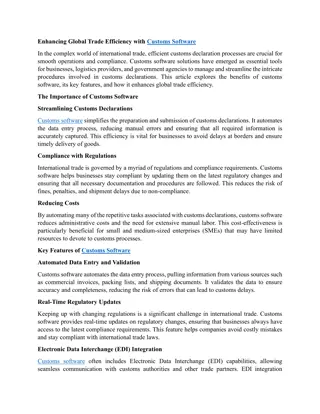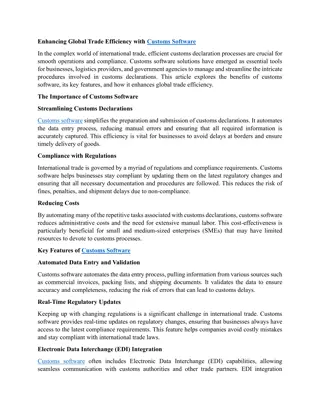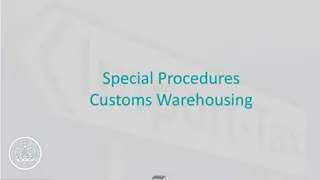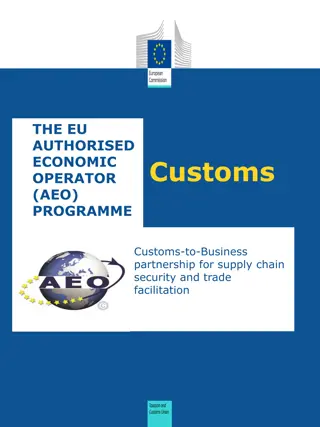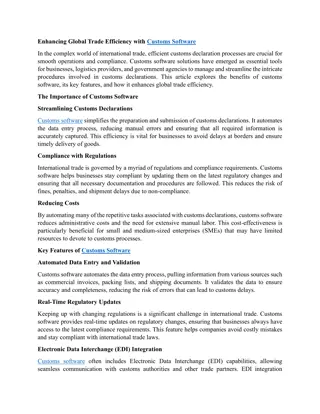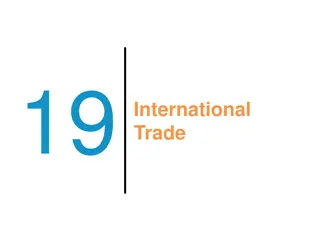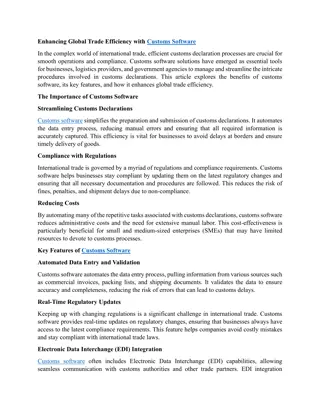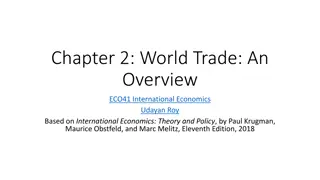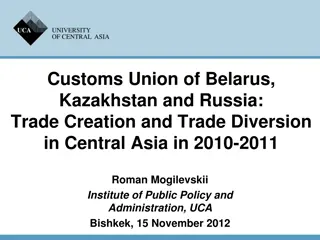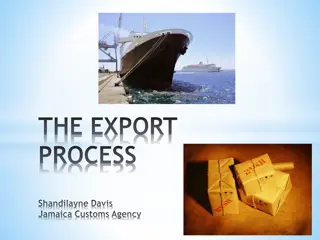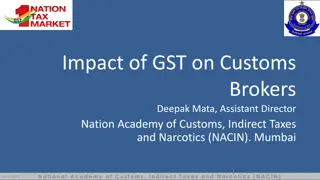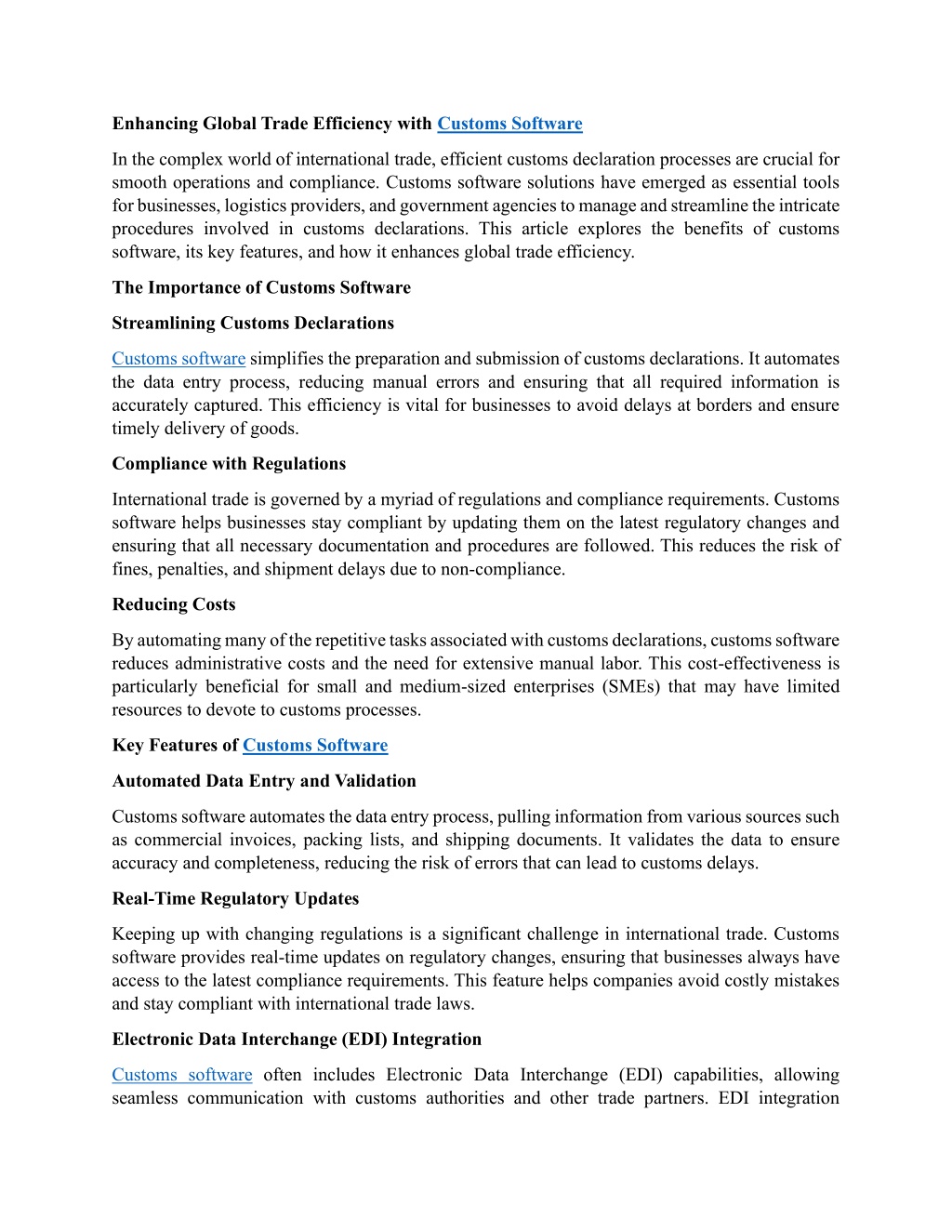
Enhancing Global Trade Efficiency with Customs Software
In the complex world of international trade, efficient customs declaration processes are crucial for smooth operations and compliance. Customs software solutions have emerged as essential tools for businesses, logistics providers, and government agen
Download Presentation

Please find below an Image/Link to download the presentation.
The content on the website is provided AS IS for your information and personal use only. It may not be sold, licensed, or shared on other websites without obtaining consent from the author. Download presentation by click this link. If you encounter any issues during the download, it is possible that the publisher has removed the file from their server.
E N D
Presentation Transcript
Enhancing Global Trade Efficiency with Customs Software In the complex world of international trade, efficient customs declaration processes are crucial for smooth operations and compliance. Customs software solutions have emerged as essential tools for businesses, logistics providers, and government agencies to manage and streamline the intricate procedures involved in customs declarations. This article explores the benefits of customs software, its key features, and how it enhances global trade efficiency. The Importance of Customs Software Streamlining Customs Declarations Customs software simplifies the preparation and submission of customs declarations. It automates the data entry process, reducing manual errors and ensuring that all required information is accurately captured. This efficiency is vital for businesses to avoid delays at borders and ensure timely delivery of goods. Compliance with Regulations International trade is governed by a myriad of regulations and compliance requirements. Customs software helps businesses stay compliant by updating them on the latest regulatory changes and ensuring that all necessary documentation and procedures are followed. This reduces the risk of fines, penalties, and shipment delays due to non-compliance. Reducing Costs By automating many of the repetitive tasks associated with customs declarations, customs software reduces administrative costs and the need for extensive manual labor. This cost-effectiveness is particularly beneficial for small and medium-sized enterprises (SMEs) that may have limited resources to devote to customs processes. Key Features of Customs Software Automated Data Entry and Validation Customs software automates the data entry process, pulling information from various sources such as commercial invoices, packing lists, and shipping documents. It validates the data to ensure accuracy and completeness, reducing the risk of errors that can lead to customs delays. Real-Time Regulatory Updates Keeping up with changing regulations is a significant challenge in international trade. Customs software provides real-time updates on regulatory changes, ensuring that businesses always have access to the latest compliance requirements. This feature helps companies avoid costly mistakes and stay compliant with international trade laws. Electronic Data Interchange (EDI) Integration Customs software often includes Electronic Data Interchange (EDI) capabilities, allowing seamless communication with customs authorities and other trade partners. EDI integration
enables the electronic transmission of customs declarations, reducing paperwork and speeding up the clearance process. Duty and Tax Calculations Accurately calculating duties and taxes is essential for compliance and cost management. Customs software automates these calculations based on the latest tariff schedules and trade agreements. This ensures accurate payment of duties and taxes, preventing overpayments and disputes with customs authorities. Document Management Managing the extensive documentation required for customs declarations can be overwhelming. Customs software provides a centralized repository for storing and managing all relevant documents, making it easy to retrieve and submit them as needed. This improves organization and ensures that all necessary documentation is readily available. Enhancing Global Trade Efficiency Faster Customs Clearance With automated data entry, real-time updates, and EDI integration, customs software significantly speeds up the customs clearance process. Faster clearance times reduce delays at borders, ensuring that goods reach their destinations more quickly and efficiently. Improved Accuracy and Compliance By automating data validation and providing real-time regulatory updates, customs software enhances the accuracy of customs declarations and ensures compliance with all relevant regulations. This reduces the risk of costly errors and penalties, providing peace of mind for businesses engaged in international trade. Better Supply Chain Visibility Customs software provides businesses with better visibility into their supply chains by tracking shipments and providing updates on their status. This visibility allows companies to anticipate potential delays and take proactive measures to mitigate their impact, ensuring smoother and more reliable supply chain operations. Enhanced Reporting and Analytics Advanced customs software solutions offer robust reporting and analytics capabilities, enabling businesses to gain insights into their customs operations. These insights can help identify inefficiencies, optimize processes, and make data-driven decisions to improve overall trade performance. Choosing the Right Customs Software Assessing Business Needs
When selecting customs software, it's important to assess your business's specific needs and requirements. Consider factors such as the volume of international shipments, the complexity of your supply chain, and the regulatory environments in which you operate. This assessment will help you choose a solution that best meets your operational needs. Evaluating Features and Capabilities Compare the features and capabilities of different customs software solutions to ensure they align with your business requirements. Key features to look for include automated data entry, real-time regulatory updates, EDI integration, duty and tax calculations, and document management. Integration with Existing Systems Ensure that the customs software can integrate seamlessly with your existing systems, such as ERP, CRM, and logistics platforms. This integration is essential for maintaining data consistency and streamlining operations across your entire supply chain. Vendor Reputation and Support Choose a reputable vendor with a proven track record of delivering reliable and effective customs software solutions. Evaluate their customer support services to ensure they can provide timely assistance and support when needed. Conclusion Customs software is a vital tool for businesses engaged in international trade, offering streamlined customs declaration processes, enhanced compliance, and reduced costs. By automating key tasks, providing real-time regulatory updates, and integrating with existing systems, customs software significantly improves global trade efficiency. Businesses that invest in the right customs software can enjoy faster customs clearance, improved accuracy, better supply chain visibility, and enhanced overall performance in the competitive landscape of international trade. Author Profile: (David Hawk) David Hawk is an Expert in Customs Declarations Services having 7+ years of experience in this industry.


